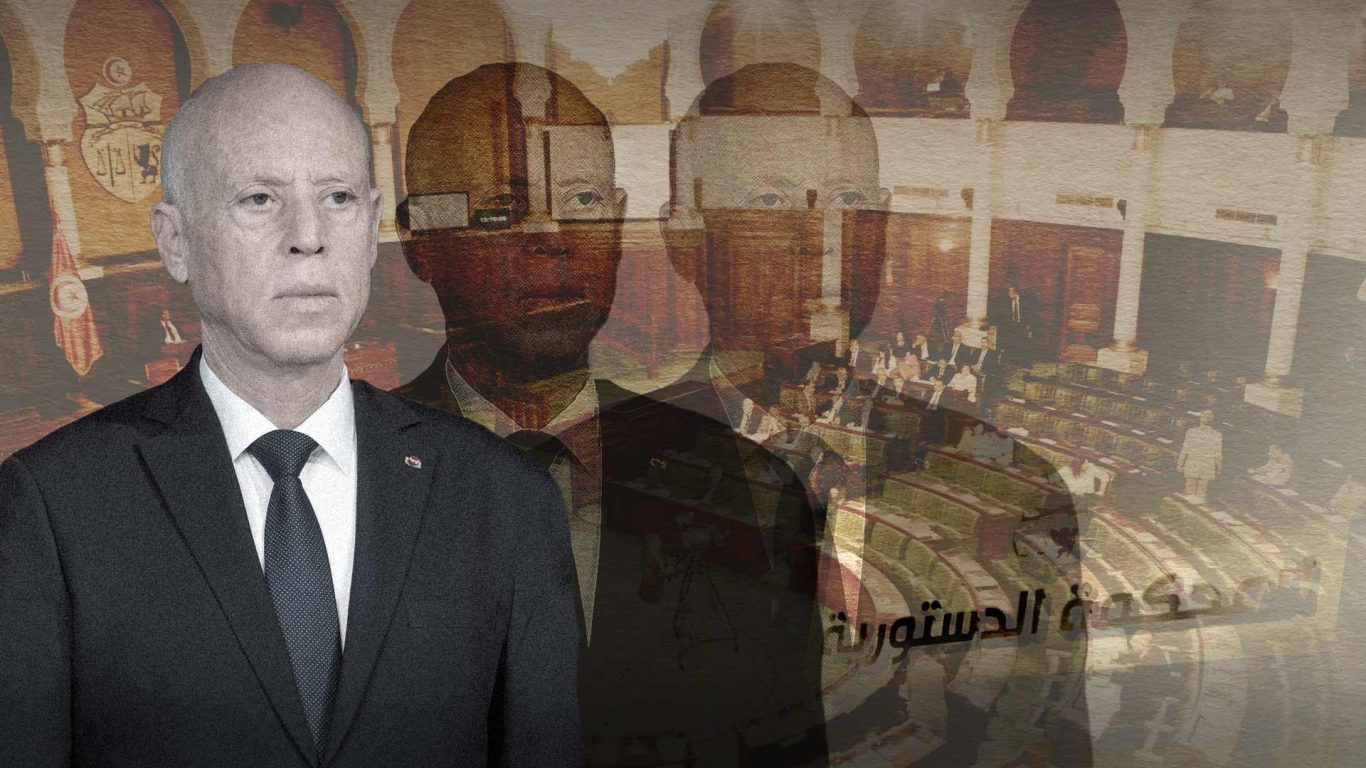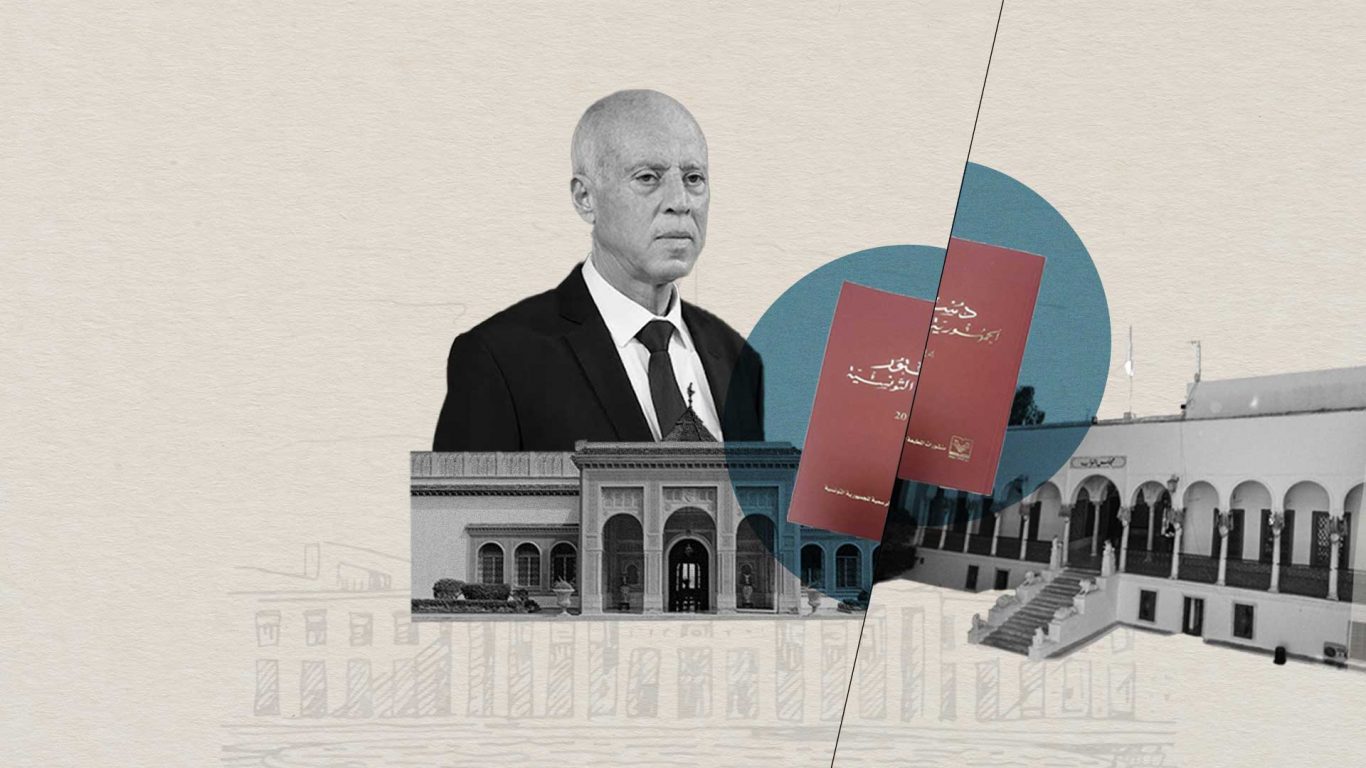The president's move was strongly opposed by those concerned. "The CSM denounces the attack on the Constitution and the guarantees of independence of the judiciary", the Council reacted in a statement published on Sunday February 6, 2022. Other institutions have also spoken out against the decision, as well as political parties such as Ettakatol, Al Joumhouri and Attayar. The Association of Tunisian Magistrates (AMT) also expressed its "profound rejection" of this measure.
What is the Supreme Judicial Council?
The CSM is responsible for guaranteeing the independence and proper conduct of the judiciary. Its prerogatives are manifold and it is a constitutional institution, i.e. it is enshrined in the 2014 Constitution, in the same way as the Assembly of People's Representatives (ARP) or the Constitutional Court.
The three articles relating to the Council were supplemented in 2016 by Organic Law No. 2016-34. These texts detail the organisation, functioning and prerogatives of the Council.
"The Supreme Judicial Council is a constitutional institution that guarantees, within the framework of its duties, the proper functioning of justice and the independence of the judicial authority", describes Article 1 of this law. "The council benefits from administrative and financial autonomy and the freedom to manage its affairs [...]". They prepare their budget, which is then discussed before an ARP committee.
"I swear by the Almighty God to safeguard the independence of the judiciary, in accordance with the provisions of the constitution and the law, to work impartially and honestly and I pledge to never disclose the confidentiality of the proceedings", is the oath taken by the members of the CSM.
"The Supreme Judicial Council (CSM) is an independent body that represents a major step forward in the consolidation of the separation of powers since its creation in 2016, and the guarantee of the autonomy of the judiciary, which has been under the control of the Executive for a very long time in Tunisia. We could say that the CSM is what the ARP represents for the legislative power", explains a specialist in public law who was contacted by inkyfada.
Amongst its prerogatives, the CSM has the exclusive competence to give its approval to magistrate appointments, and to propose senior magistrates. It can also dismiss or suspend these magistrates if the decision is substantiated. Most importantly, it rules on the careers of magistrates, including their appointment.
"Each Council of the Judiciary shall rule on career matters for the magistrates under its jurisdiction, namely appointments, promotions and transfers. Each council shall also rule on requests for waiving immunity, resignations, detachments, early retirement and leave of absence, in accordance with the specific statutes for magistrates." - Article 45, Law n°2016-34.
Additionally, the council is responsible for appointing four out of the twelve members of the Constitutional Court, in the same manner as the President of the Republic and the ARP. As this court has not been established, this prerogative has not been assumed. The CSM also has the task of issuing recommendations on draft laws and proposals relating to the organisation and administration of justice, and proposing reforms.
On the same subject
This institution is composed of 45 members and is subdivided into three councils: the Council of the Judicial Magistracy, the Council of the Administrative Magistracy and the Council of the Financial Magistracy, which sometimes meet in plenary session.
Each subdivided council is composed of 15 members: 4 magistrates appointed according to their functions (for example, the first president of the Tunis Court of Appeal, the first president of the Court of Auditors), 6 magistrates elected by their peers, as well as 5 "independent specialists" ( lawyers, bailiffs, teacher-researchers, accountants etc. ).
This institution is thus composed of various professional bodies, elected in different ways. Far from being a new concept, this was established through law n°67-29 under Bourguiba's administration in 1967, but was reformed after the revolution.
Why is Kaïs Saïed targeting the CSM?
In a note based on the recommendations made by the Truth and Dignity Commission (TDI) in December 2021, the International Commission of Jurists (ICJ) proposed to strengthen the prerogatives and competences of the Supreme Judicial Council (CSM), a key institution for ensuring the autonomy of the judiciary, the separation of powers and the rule of law.
The International Commission of Jurists (ICJ) urges the Tunisian authorities to "give the Supreme Judicial Council jurisdiction over all matters relating to the careers of magistrates, including their selection, appointment, training, evaluation, transfer, promotion, discipline and dismissal, excluding any substantial role for the executive and legislative branches of government in this field".
However, Kaïs Saïed has repeatedly targeted the judiciary, regarding it as simply as " another function of the State" rather than a power in its own right. He repeatedly targeted magistrates, some of whom were accused of corruption. "You can't imagine the money that some judges have received, billions and billions", he declared in his speech on the night between February 5-6, 2022.
"The place for some judges is not where they are, but in the dock of the accused", he said, referring more specifically to the members of the CSM as those "whose positions and appointments are for sale and are based on their affiliations".
In recent years, two cases involving senior magistrates have shaken the Tunisian judicial system. Taïeb Rached, former president of the Court of Cassation, was accused of illegal financial gain, while Béchir Akermi, the public prosecutor of Tunis and former investigating judge in the case of Chokri Belaïd's assassination (as well as reputedly being close to the Ennahda party), was accused of obstructing investigations looking into the political assassinations in 2013.
However, the reform of the judiciary is one of the responsibilities of the CSM. "The plenary assembly of the three Councils of the Judiciary proposes reforms and gives recommendations on proposals and bills relating to justice that are mandatorily submitted to it", according to Article 114 of the Constitution. The suspension of the ARP and the dissolution of the CSM therefore pave the way for Kaïs Saïed to unilaterally reform the judiciary.
"By deciding to dissolve the Supreme Judicial Council, President Saied is demonstrating his determination to remove the last remaining defence against his one-man power in Tunisia: the judiciary", commented Said Benarbia, Director of the ICJ's Middle East and North Africa Programme.
Why was the dissolution announced on February 6, 2022?
The tensions between Kaïs Saïed and the judiciary are hardly new. As early as July 25, 2021, the president announced in his televised speech that he would take over as president of the prosecution service. The interim Minister of Justice, Hasna Ben Slimane, was dismissed the next day.
Kaïs Saïed has targeted the members of the CSM in several of his speeches, particularly referring to their privileges. On January 19, 2022, he abolished their bonuses and benefits via presidential decree, amending law 2016-34, and foreshadowing subsequent measures against the CSM and its members.
Ultimately, it was on the eve of the commemoration of the ninth anniversary of Chokri Belaïd's death that the president chose to announce the dissolution of the CSM. The assassination of this prolific Tunisian politician and lawyer on February 6, 2013, remains unresolved by the judiciary.
In his speech, Kaïs Saïed linked these two events. "Unfortunately in this country some judges in the courts have manipulated the case of Chokri Belaïd", he argued from within the Ministry of the Interior. "This is not the first trial where they have attempted to hide the truth for years", thus placing the responsibility for the judicial delays on Ennahdha, and thus justifying the dissolution of the CSM.
Kaïs Saïed had gone to the Ministry of the Interior to announce that he was authorising the gathering to commemorate the death of Chokri Belaïd, despite this contradicting the official ban on all forms of public gatherings that was announced on January 13, on the eve of the 11th anniversary of the revolution.
Does Kaïs Saïed have the authority to dissolve the CSM?
Shortly after Kaïs Saïed's announcement, the CSM rejected the decision "in the absence of a legal and constitutional framework" that would allow the president to dissolve the institution. The Tunisian Association of Young Magistrates also rejected the decision, stressing that the President of the Republic was not authorised to dissolve the CSM.
Indeed, neither the 2014 Constitution, nor the law pertaining to the Supreme Judicial Council, provide for its dissolution.
On July 25, 2021, Kaïs Saïed used Article 80 to adopt
"the measures imposed under the state of emergency". In the absence of a Constitutional Court to rule on the legality of these measures, he has since governed by presidential decree.
On the same subject
On Monday February 7, 2021, police forces assembled in front of the headquarters of the Supreme Judicial Council to shut it down and prevent any work from being done. "We don't know who took this illegal decision, but the police that were deployed said they were carrying out instructions", the president of the CSM, Youssef Bouzakher, told France 24.
"This illegal shutdown without any judicial grounds proves that we have reached a dangerous stage where the executive power is taking control of state institutions and the judiciary by force", he said.
What are the consequences for the judiciary?
The CSM announced that "its members will remain in session", denouncing this "attack on the Constitution and the guarantees of judicial independence". However, given the abundance of police in front of its premises, it seems difficult for the Council to convene at their headquarters.
The Association of Tunisian Magistrates called for an overarching strike in all courts throughout the country on Wednesday 9th and Thursday 10th of February 2022. "All magistrates in the three judicial categories, administrative and financial, are called to a complete suspension of work", thus denouncing "the flagrant violation of the independence of the judicial authority by the President of the Republic".
While waiting for the publication of the presidential decree, which should specify Kaïs Saïed's plans for the judiciary's organisation, the situation is causing concern to many national and international political and civil organisations. "The dissolution of the Supreme Judicial Council (CSM) in Tunisia seriously undermines the rule of law in the country", the United Nations High Commissioner for Human Rights, Michelle Bachelet, said on Tuesday.
"In the absence of the CSM as stipulated by the Tunisian Constitution and the law relating to the organisation of this institution, Kais Saied is pushing us into a worrisome situation where he is seizing more and more of the full powers", commented a public law specialist contacted by inkyfada. "Today, if the CSM is dissolved, we can no longer simply speak of independent justice."






